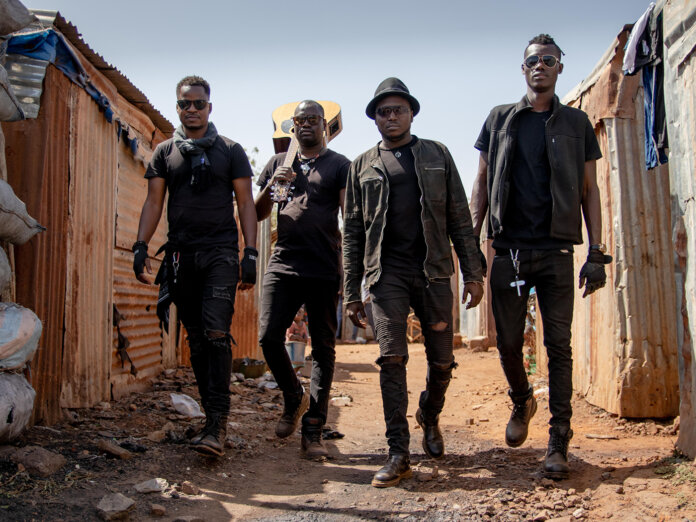It’s impossible to separate Songhoy Blues and politics. Formed in 2012 as a direct result of being forced from their homes, after rebel jihadists took control of northern Mali and outlawed all music, the band were refugees in their own land when they attempted to start new lives in the capital city of Bamako, down in the south. They took their name from the centuries-old ethnic group they belonged to, just as their music was conceived as a desert blues celebration of a displaced culture.
A guest slot on Maison Des Jeunes, from Damon Albarn’s Africa Express, led to their aptly titled 2015 debut, Music In Exile, which coincided with an appearance in They Will Have To Kill Us First, an award-winning documentary about Malian musicians’ struggle to be heard during the crisis. Amid fluctuating levels of civil war, Résistance followed two years later. The arrival of Optimisme comes in the wake of an insurgent summer, when a military coup seized power from President Keita.
As the title implies, Optimisme finds Songhoy Blues tackling adversity and national unrest with a generous dollop of positivity. The anger may be palpable, but they don’t go in for bitter polemic. Instead the quartet – frontman Aliou Touré, guitarist Garba Touré, bass player Oumar Touré (none of whom are related, incidentally) and new drummer Drissa Koné – choose to spread the message via impossibly infectious grooves and an exhilarating sense of forward motion.
This is partly down to producer Matt Sweeney, leader of math-rockers Chavez and sometime Bonnie “Prince” Billy collaborator. Reprising his role from last year’s “Meet Me In The City” EP, Sweeney urged the band to replicate the dynamic intensity of their live shows, recording the album over the course of a week in Brooklyn, at the back end of a US tour.
Stylistically, Optimisme is a bubbling conflux of West African polyrhythms and elastic guitar rock. A more concentrated vision than Résistance, which found space for R&B and fanfares of brass, at times it hits harder and heavier than anything they’ve attempted before. “Badala” (rough translation: ‘We Don’t Give A Shit’) certainly fulfils its intention, hurtling along like something from late-’70s Thin Lizzy. “Korfo” (‘Chains’) comes at it from a different angle, all blended vocals and an ear-bending melody, before transforming itself into an unstoppable rock beast. As the son of Ali Farka Touré’s old percussionist Oumar Touré, Garba Touré lives up to his musical pedigree with some vigour, either locking into a trebly vamp or, as on “Worry” or “Dournia” (‘Life’), a seriously shreddy solo.
Other songs feel more distinctly Malian in form. “Assadja” and “Fey Fey”, for instance, are each carried by liquid grooves that beg you to shake a hip, further animated by surging beats and Aliou Touré’s agile vocals. Most of these tunes are delivered in Songhai, though there’s the odd excursion into colonial French and, for the first time, English, in the shape of “Worry”. The song is aimed at the younger generation in Mali, in particular the need to keep self-possessed and hopeful amid so much civil turbulence. “There is a long way to go/There is a long journey,” sings Aliou Touré, more in encouragement than despair. “Keep fighting today.”
The more ingrained aspects of cultural tradition are addressed on several songs about women’s rights. “Gabi” (‘Strength’) calls for an end to arranged marriages, told from the viewpoint of a reluctant bride-to-be trying to reason with her parents: “Let me tell you that our generation is different from yours… Let me choose the one I want.” Similarly, the thunderous noise of “Badala” reflects its protagonist’s decision to break free from the patriarchy and shape her own future.
These themes feed into wider questions of national identity. The warrior meaning behind “Assadja” relates to a person’s willingness to contribute to society. “Fey Fey” (‘Division’) recognises the various factions looking to separate Mali, but urges ethnic communities to stick together, just as they have done for centuries: “Even at the cost of our blood or our soul/We are not going to give in to the division of Mali.” By the same token, “Barre” (‘Change’) finds Songhoy Blues concluding that the key to their country’s future lies with its youth. Corruption and injustice may have become the norm, but “change is essential for development”. Over loose funk licks and percussive harmonies, the band’s mission is unequivocal: “Youth! Let’s rise for this change!” As protest music goes, Songhoy Blues are intent on mobilising hearts and minds in their own inimitable way, through force of will and sheer exuberance.
You can read an in-depth interview with Songhoy Blues in the December 2020 issue of Uncut, in shops now!



